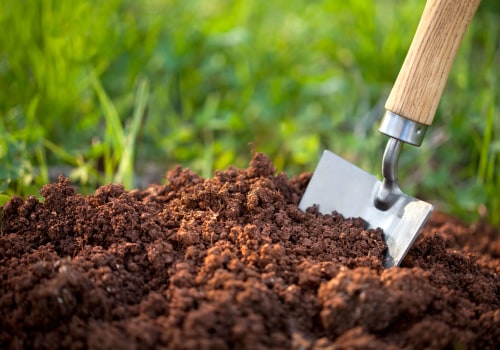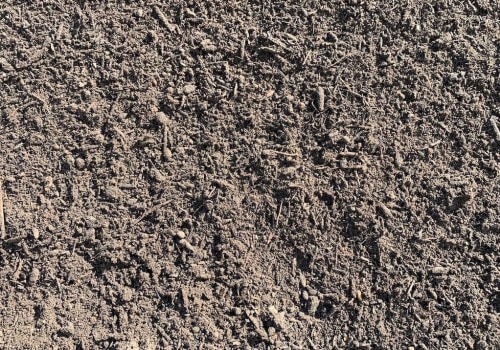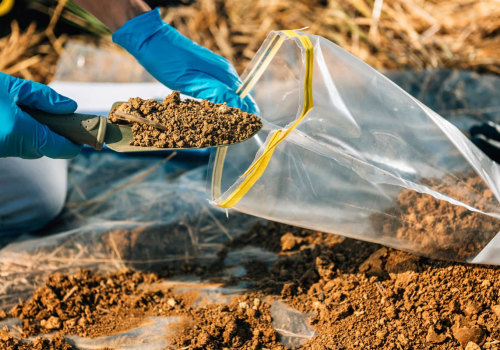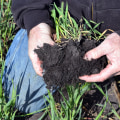Organic soil amendments are key for any garden enthusiast or farmer looking to grow healthy, sustainable crops. But, what exactly are soil amendments and how do you know where to buy them? This article will answer those questions and more, providing you with the information you need to make an informed decision when it comes to purchasing organic soil amendments. Whether you're a beginner or a seasoned gardener, understanding the basics of organic soil amendments will help you take your crops to the next level. From understanding what organic soil amendments are to knowing where to buy them, this article will provide all the information you need to make sure your crops thrive. Organic soil amendments are a type of soil conditioner that are added to soil in order to improve its fertility and structure. They are made of natural materials such as compost, manure, and other organic matter that are rich in nutrients and beneficial microorganisms.
Organic soil amendments are important because they help to restore the soil's natural balance and promote healthy plant growth. They also help to improve the soil's texture, water retention, drainage, and aeration, which all contribute to healthy plants. Organic soil amendments come in a variety of forms, including compost, manure, and other organic materials. Compost is created by decomposing organic matter such as leaves, grass clippings, food scraps, and manure. It is high in nutrients and beneficial microorganisms, which help to build soil fertility.
Manure is another type of organic material that can be used as a soil amendment. It is made from animal waste and is high in nitrogen, phosphorus, and potassium. Other organic materials such as peat moss, mulch, and sawdust can also be used as soil amendments. Organic soil amendments can be used in a variety of scenarios. In vegetable gardens, they can be used to improve the soil's fertility and texture.
In flower beds, they can be used to help retain moisture and promote healthy root growth. In lawns, they can be used to improve drainage and aeration. In addition, organic soil amendments can be used to reduce compaction and provide additional nutrients for the plants. Using organic soil amendments can provide many benefits for your plants. They can improve the soil's fertility and texture, help retain moisture, increase aeration and drainage, reduce compaction, and provide additional nutrients for the plants.
Additionally, organic soil amendments can improve the overall health of the environment by helping to reduce runoff into rivers and streams. When looking for organic soil amendments, it is important to buy from reputable sources. Online stores such as Amazon or local nurseries are good places to start your search. You should also read labels carefully to ensure that the product contains only natural ingredients and no synthetic chemicals or fertilizers. Additionally, you should make sure that the product was produced in an environmentally friendly manner. It is also important to properly store organic soil amendments.
They should be kept in a cool, dry place away from direct sunlight or moisture. Additionally, it is important to follow package instructions for proper application of the amendments. Finally, it is important to determine how much organic material is needed for a given area and how to apply it correctly. When using organic soil amendments, it is important to be aware of any safety concerns associated with them. Some products may contain chemicals or fertilizers that could be harmful if ingested or inhaled.
Additionally, some products may contain microorganisms that could cause disease if mishandled or improperly stored. Therefore, it is important to always read the labels on products before using them. Organic soil amendments are an important part of successful gardening and farming. Understanding what they are and how they work can help you get the most out of your plants. Knowing where to buy them from reputable sources is also essential for ensuring quality products.
Finally, understanding how much organic material is needed for a given area and how to properly store and apply them can help you achieve optimal results.
Where to Buy Organic Soil Amendments
When it comes to finding the right organic soil amendments for your garden or farm, there are several different options. You can purchase them in stores, online, or from a local garden center. Buying in stores gives you the chance to ask questions and get advice from knowledgeable staff, while online and mail-order shopping will give you more selection and price options. When buying online, you'll want to be sure to research the company's reputation and read customer reviews to make sure you're getting high-quality products. You'll also want to make sure that they offer a money-back guarantee in case the product doesn't meet your expectations. You can also find organic soil amendments from local garden centers and nurseries.These stores typically have knowledgeable staff on hand who can help you choose the right product for your needs. Additionally, they often offer a wider selection of products than stores, making it easier to find exactly what you need. Finally, you can buy organic soil amendments directly from farmers and manufacturers. This is an especially good option if you have specific questions or needs that require a specialized answer. Farmers and manufacturers will often offer discounts for bulk purchases as well.
Storing & Applying Organic Soil Amendments
Storing and Applying Organic Soil AmendmentsOrganic soil amendments are an important part of successful gardening and farming.Storing and applying them correctly can help you get the most out of your plants. It is important to store organic soil amendments in a dry, dark place, such as a garage or shed. You should also avoid placing them in direct sunlight or near any heat source, as this can cause them to break down faster. When it comes time to apply organic soil amendments, you should mix them into the top 6-8 inches of soil using a spade or shovel. You will want to add the amendment at the recommended rate specified by the manufacturer, usually around 2-4 pounds per 100 square feet.
After adding the amendment, you should gently mix it into the soil with a rake or hoe. Once you have applied the amendment, you can use a water hose to water your plants and allow the amendment to soak in. Organic soil amendments are an important part of any successful gardening or farming operation. Storing and applying them correctly is essential to getting the most out of your plants. By following the tips outlined here, you can ensure that your soil amendments are stored and applied properly.
Types of Organic Soil Amendments
Organic soil amendments are materials added to soil to improve its fertility, structure, and drainage.These materials can come from plant or animal sources, and they can be used to amend a wide variety of soils. Some of the most common types of organic soil amendments are compost, manure, mulch, and cover crops.
Compost
Compost is the most common type of organic soil amendment. It’s a mix of decomposed plant matter, including leaves, grass clippings, and kitchen scraps. Compost is rich in nitrogen, phosphorus, and potassium, as well as other essential nutrients.It improves soil structure and drainage while also boosting fertility and helping plants absorb water and nutrients.
Manure
Manure is another popular type of organic soil amendment. It comes from animal waste such as cow, horse, or chicken manure. Manure is high in nitrogen and other essential nutrients that help plants grow. It also helps to improve soil structure and aeration.Mulch
Mulch is a type of organic material that’s used to cover the surface of the soil.It helps to retain moisture in the soil and prevent weeds from growing. Mulch also helps to keep the soil temperature even and protect plants from extreme cold or heat.
Cover Crops
Cover crops are plants grown specifically for the purpose of improving soil health. They help to reduce erosion, add organic matter to the soil, and improve nutrient levels. Cover crops also help to suppress weeds and keep pests away from your plants.What Are Organic Soil Amendments?
Organic soil amendments are materials that are added to soil in order to improve its physical, chemical, and biological characteristics.These amendments can be natural, like compost, manure, or peat moss, or synthetic, like fertilizers. They help improve the overall quality of the soil by increasing its fertility, aeration, water retention, and nutrient content. In addition, organic soil amendments can help reduce erosion and increase the soil's ability to retain moisture. Organic soil amendments are especially important for gardening and farming, as they help create a healthier environment for plants to grow in.
For example, compost and manure help add organic matter to the soil, which increases its fertility and helps it better retain water and nutrients. Manure also helps improve the soil's structure, making it more aerated and better able to support healthy root growth. Peat moss is another popular organic amendment that helps retain moisture and nutrients in the soil while also improving its aeration. In addition to improving soil quality, organic soil amendments can also help reduce pests and disease in plants.
Organic amendments like manure, compost, and mulch can help create an inhospitable environment for pests and disease-causing organisms. This is especially important for farmers and gardeners who want to avoid using synthetic chemicals to control pests and diseases. When choosing organic soil amendments, it’s important to choose ones that are appropriate for your particular needs. Different types of organic amendments have different properties and benefits, so it’s important to do your research before buying. Additionally, it’s important to buy from reliable sources in order to ensure the quality of the amendments you’re buying.
Where to Buy Organic Soil Amendments
Organic soil amendments can be purchased from most garden supply stores or online retailers.It’s important to read labels carefully when purchasing organic amendments, as some may be labeled as “natural” but may actually contain synthetic ingredients. Additionally, it’s important to make sure that the source of the amendment is reputable in order to ensure that it is of high quality. Organic amendments can also be made at home using materials like compost or manure. Making your own amendments can be a great way to save money while still getting the benefits of organic materials. Organic soil amendments can be an invaluable tool for successful gardening and farming, as they help to improve soil structure, fertility, water retention, and aeration. They can also help to reduce erosion, suppress weeds, and encourage beneficial soil organisms.
When choosing organic amendments, it's important to read labels carefully and follow all instructions for proper use and storage for optimal results. Whether you are a professional or a beginner gardener, understanding what organic soil amendments are, how they work, and where to buy them can help you get the most out of your plants. Many garden centers and online retailers offer a variety of organic soil amendments to meet your needs.











Leave a Comment